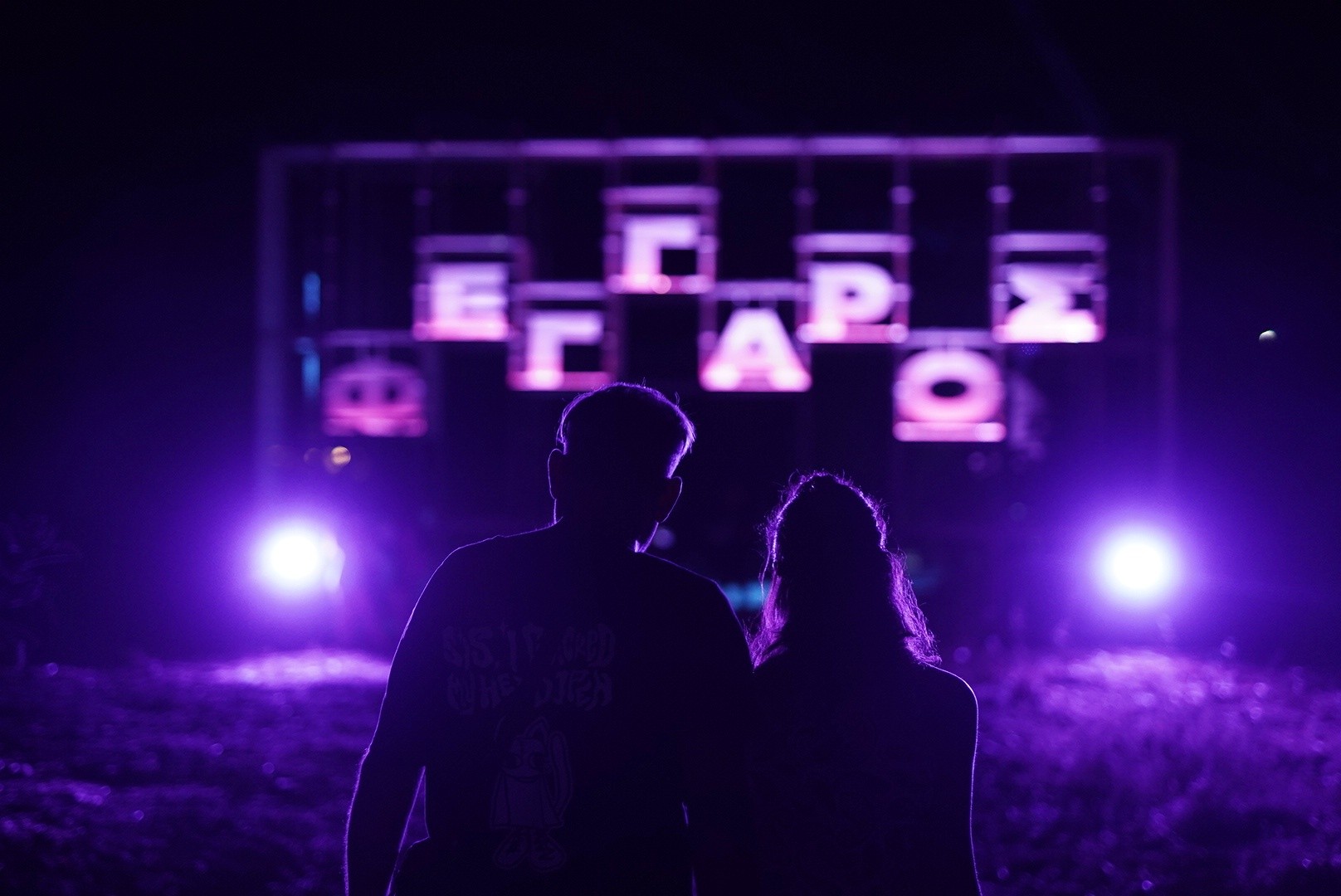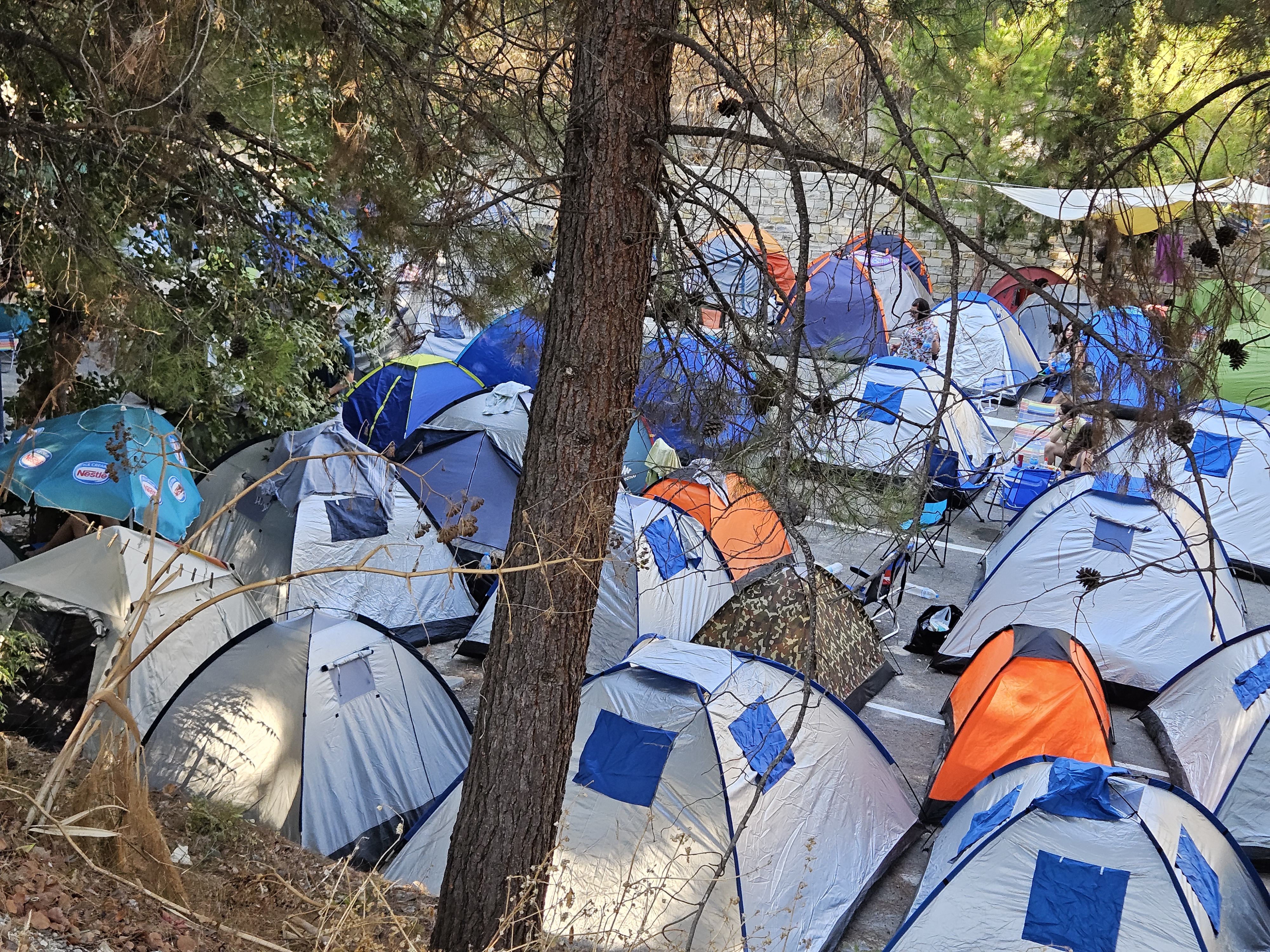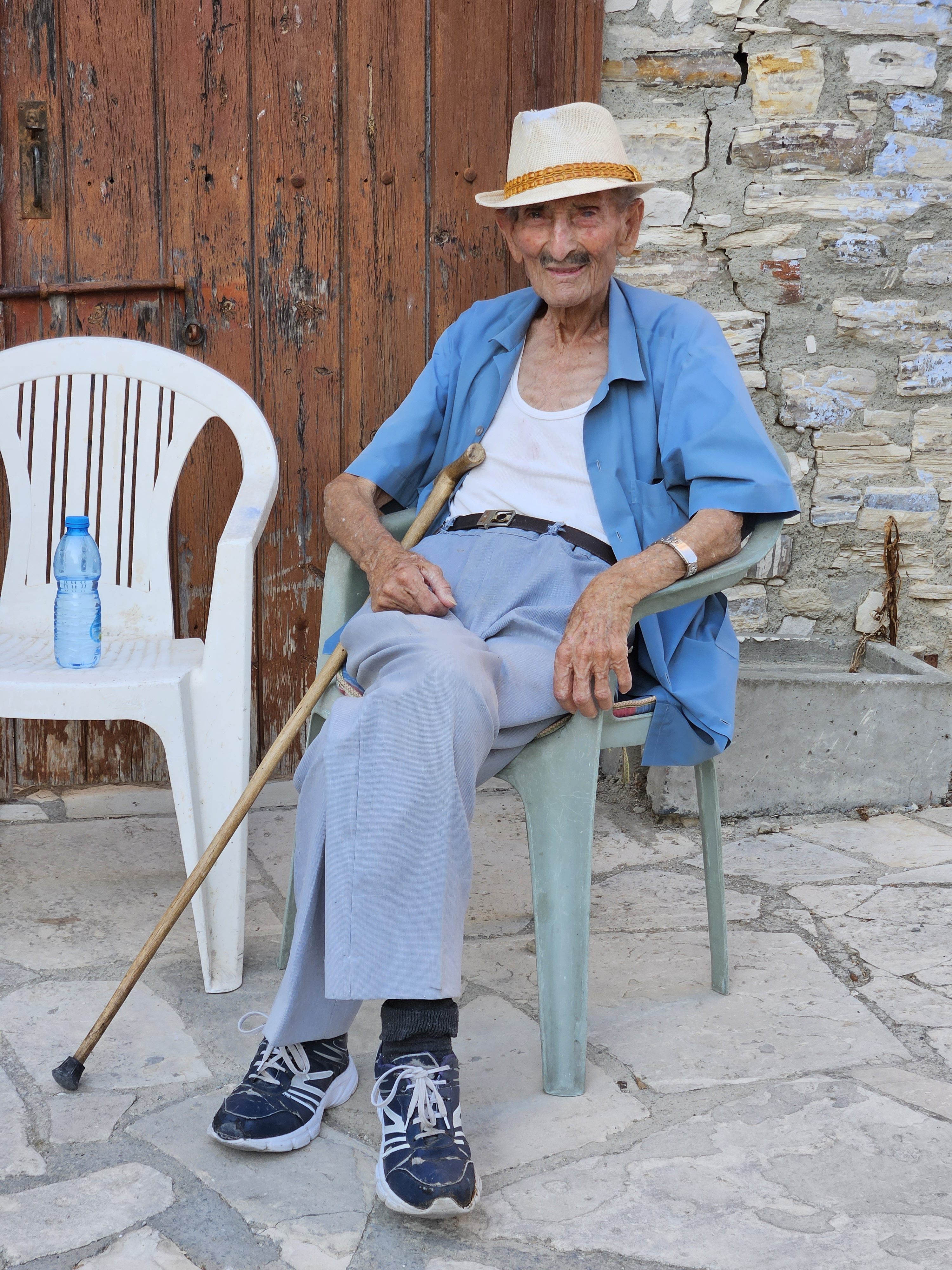The romance of music outdoors in the evening, workshops, a sleepy village brought to teeming life for the weekend: the Fengaros music festival
Looking back, I had no clue what I was getting into. I’d heard of Fengaros (who hasn’t?), the annual music festival showcasing 50 bands over three days, but the image in my mind was a lot more… compact.
I assumed there’d be some huge empty field near the village of Kato Drys, where the fest takes place (this year’s 12th edition was from August 1-3). I’d park the car, leave my stuff inside, then mingle with the crowds till I got the lay of the land.
Instead, a mile or so before the village, I found myself being stopped and directed to a small clearing already filling with cars, then placed on a shuttle bus to the festival, feeling quite conspicuous with my bits of journalistic paraphernalia – not to mention being a good 20 years older than anyone else on the bus.
It was around 5.30pm on Day 2. By the time I left five hours later, with the festival still in full flow, my little field and two other fields had long since filled up, the road all the way to the village was lined with cars, the road all the way back to the turn-off was lined with cars, and a second bus was bringing in people who’d had to park up the hill in Lefkara.

And this was just Day 2. According to the parking attendant, Day 3 (a Saturday) was expected to attract 8,000 people.
“Not everything has to be a Lollapalooza or a Glastonbury,” an American named Jared tells me later. “I think this scale of music event is much more authentic.” True enough; but Fengaros might as well be Glastonbury, where Kato Drys is concerned.
“This is a village with 50 people,” I’m informed by a festival-goer – a rare case of a whole family attending, my new friend, who runs an IT company in Nicosia, lounging on plastic chairs near the main stage alongside his wife (who hails from the village) and two small children. “Usually, on a weekday, you can walk around and not see a single soul.”
The effort to control all this mayhem – mostly by Louvana Records, the guiding force behind the fest – is impressive, even just on a logistical level: the buses toing and froing, the cars carefully managed. Locals are apparently asked to provide their licence plates, to reduce the flow of outsiders into Kato Drys as much as possible.
That’s the other big way in which the real Fengaros differed from the one in my head: I didn’t realise the festival was actually in Kato Drys, in the sense of taking over the village. With the exception of the ‘Field Stage’, the largest of its three stages, the rest takes place amid the old stone walls and sleepy houses, with youngsters crowding the cobbled streets till three in the morning.
It soon becomes clear that Fengaros is an ecosystem, its various parts in mostly harmonious co-existence. One part is the Field Stage itself – the kind of conventional setting I had in mind, an open-air stage flanked by a line of stalls selling drinks and food. I note crispy chicken tacos, rigatoni bolognese, lemongrass ginger noodles. Fancy stuff.

I’m early, of course, and the sprawling field is still largely empty. The 6.30 slot (the first of the night) has gone to a local rock band called The Black Strays. More on them later – but I feel a little bad as I watch them play material from their new album to an audience of a couple of dozen boys in black T-shirts. “Follow this fucking band!” urges one of the guys from the stage, to scattered applause.
The real audience will be arriving later, once the sun goes down; tonight’s big draw, Berlin-based singer-songwriter Alice Phoebe Lou (a huge star, with 1,910,486 monthly listeners on Spotify), goes on stage at 11pm. Much of the audience are still down the road, in the hundreds of tents at the Fengaros campsite.
The campers are another part of the ecosystem, their tents appearing – clustered together, like a field of giant mushrooms – in a shady hollow just before the village. Almost all are here for the duration, hardcore Fengaros-goers. Most have been here before. A 19-year-old psychology student, here with a party of 10 from Limassol, tells me she’s been coming to the fest since she was 15. What’s the best part? “The whole vibe in the village,” she replies vaguely.
The campers are a chilled, languid bunch, relaxing to the sound of cicadas and the occasional clatter of backgammon tiles – though they mostly spend their day at the beach, returning in late afternoon to shower, grab a bite and head down to the music. The night trippers, whose cars line the road, are another part of the ecosystem – and of course the Kato Drys villagers themselves are another part.
Some of the villagers join the adventure, opening handicraft shops and setting up food stalls. Others go on with their lives, pointedly ignoring the intruders.
I walk to the church, up the road from the music, drawn by the sounds of the evening service. A very old lady sits on the low wall outside, Zimmer frame within easy reach, Sri Lankan helper at a discreet distance away. The old lady looks at me with a resigned, slightly pursed expression. It’s the look of someone who knows she’s providing a spectacle, but won’t let embarrassment scupper her nightly ritual of catching the breeze and listening to the service.
A little later, on the winding road down to the Field Stage, an old man sits on a plastic chair outside an even older house, looking smart-casual in blue top and sky-blue pants, his panama hat at a rakish angle. He says nothing – but he too, in his way, is part of Fengaros, and obviously knows it.

Almost all the villagers I talk to are gushing in their praise, though also sounding a note of caution. The fest brings a lot to this quiet village, as implicitly confirmed by the fact that nearby Lefkara is now hosting rival festival Afrobanana – but there’s also an ambivalence, there has to be.
“No, I think it shines a light on the beautiful village that we have!” says Tanya when I ask if the locals harbour any resentment at being taken over for three days. Tanya – selling watermelon juice with her partner Alex – is a special case, having lived in London all her life (she and Alex run a vegan restaurant) while coming back to Kato Drys, her parents’ village, every summer. “Seeing it this week, it’s crazy to see how it transforms. It’s really beautiful.”
But the older locals? Don’t they mind the road being blocked, and music till three in the morning?
“It does cause disruption,” she admits thoughtfully. “And I think it would be good to know more, maybe, about how the village directly benefits from the festival… But there are so many ways!” she adds quickly, gesturing around at the crowds and excitement. “There are so many ways.”
The kids – it must be said – are all right. The vibe is friendly, without so much as a raised voice. Man-buns and nose rings are much in evidence, and I note a (slightly older) hippy type in a ‘Divine Mother Kali’ T-shirt. A blonde, foreign-looking girl in dark glasses and short shorts lingers mysteriously, away from the crowds – is she posing for Instagram? – in what was once the courtyard of a rundown stone house.
The youngsters, the campers, the villagers… have we left out any part of the ecosystem? Yes indeed, the most important part: the musicians.
Louvana aren’t an event management company. They’re a record label, with a strong commitment to local talent. Bands aren’t allowed to play covers at Fengaros, it’s original material only. Then you have the workshops; I duck into the so-called Cupra Museum stage to hear a few minutes of the FMV Student Collective, a group of (I think) high-school kids put together at the Fengaros Music Village workshops, which took place the week before.
This, in short, is a festival for everyone – from global stars with two million Spotify listeners like Alice Phoebe Lou (also on tonight’s card is Negros tou Moria, a Ghanaian-Greek rapper who’s been making big waves), to teens with dreams of making music, to… well, the Black Strays, for instance.
I catch up with the band after their set and find them charming, in the amiable way of musicians who are seasoned but not yet cynical. They’re all on the cusp between 30s and 40s, having played in other bands and met through music; the Limassol-based Strays (https://blackstrays.com/), formed in 2021, is the project of their early middle years, the music composed collectively in mammoth jam sessions.
Are they pros?
“We’re hobbyists,” admits vocalist Ef Matt (real name Stathis). “But we look on it a bit more seriously than just a hobby.”
They all have day-jobs: Ef Matt’s an accountant, Chris Karp (bass) a physics teacher. Philip K (guitar) owns a winery – a commandaria winery in the village of Doros – Mike K (drums) is a maintenance manager at a real-estate company. Yet the music is its own thing, living and germinating in them – as it does in all musicians – growing like a weed among the day-jobs so it can be joyously blasted on the clear evening air outside Kato Drys.
“It’s not just now and then, whenever there’s a live gig,” says Philip. They rehearse three times a week – but also spend money on promotion and advertising. “We treat it like a business,” he says, then pauses: “Just a bit more romantic”.
This, too, is part of Fengaros, probably the biggest part: the romance of music and being a musician, a motley assortment of bands brought together in a hillside village in Cyprus. Sure, I say, reluctant to break the spell – but I watched you play. There were only a handful of people in the audience.
“We don’t care!”
Isn’t it a bit depressing, though?
They shake their heads, humouring my general cluelessness. “The target at every live gig,” explains Philip, “is to try and win over one person. You don’t even need two. Just one!”
“And tonight,” adds Matt, chuckling, “it looks like that person is you.”
We part ways, the Strays to load their equipment, I walking back to the village with a spring in my step. A big music festival (maybe not Glastonbury big, but big enough) isn’t just an event: it’s a being, a creature, an organism. I arrived without a clue – but I’ve learned a thing or two, and now I’m a rock band’s raison d’être on this fine summer night. I too, it seems, am part of Fengaros.
UPDATE: Since this piece was originally published, Fengaros have announced that this year’s festival was the last one to take place in Kato Drys, and they’re now “on a treasure hunt” for a new venue.







Click here to change your cookie preferences